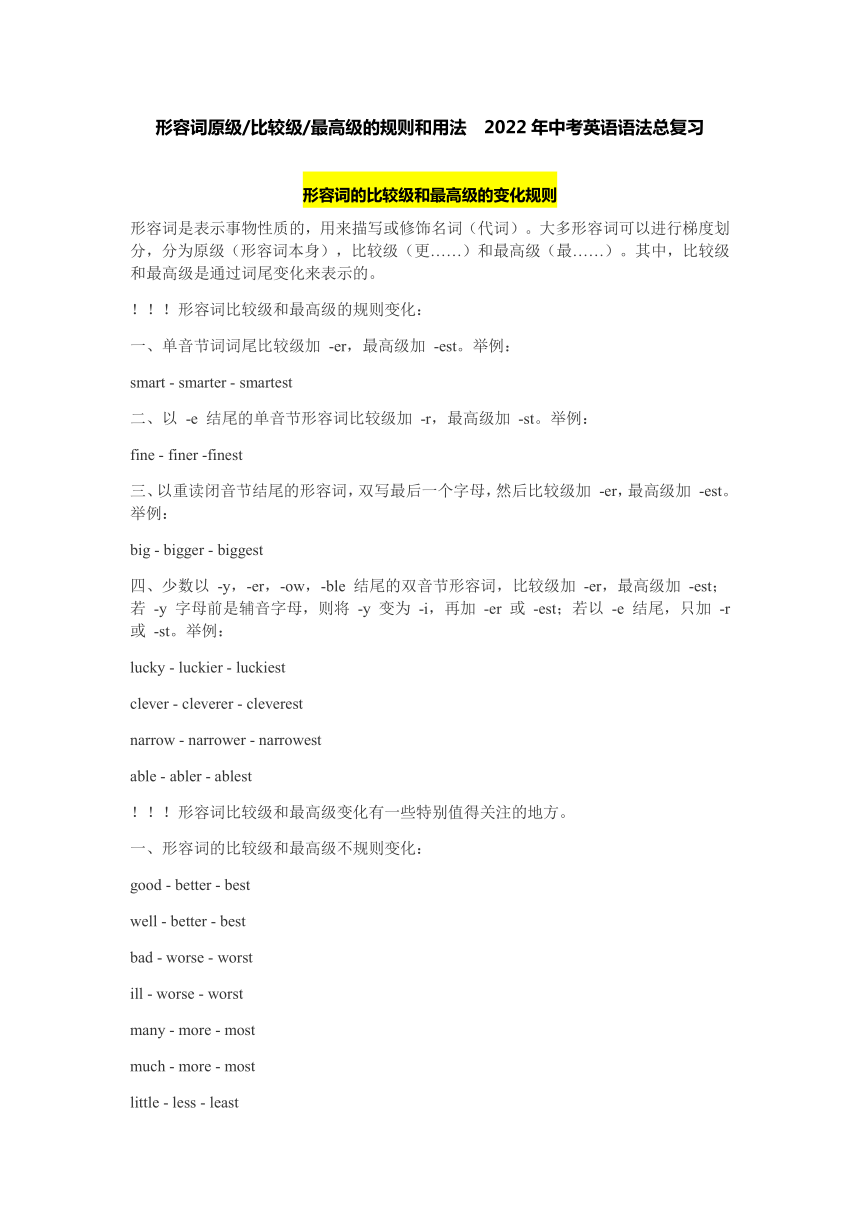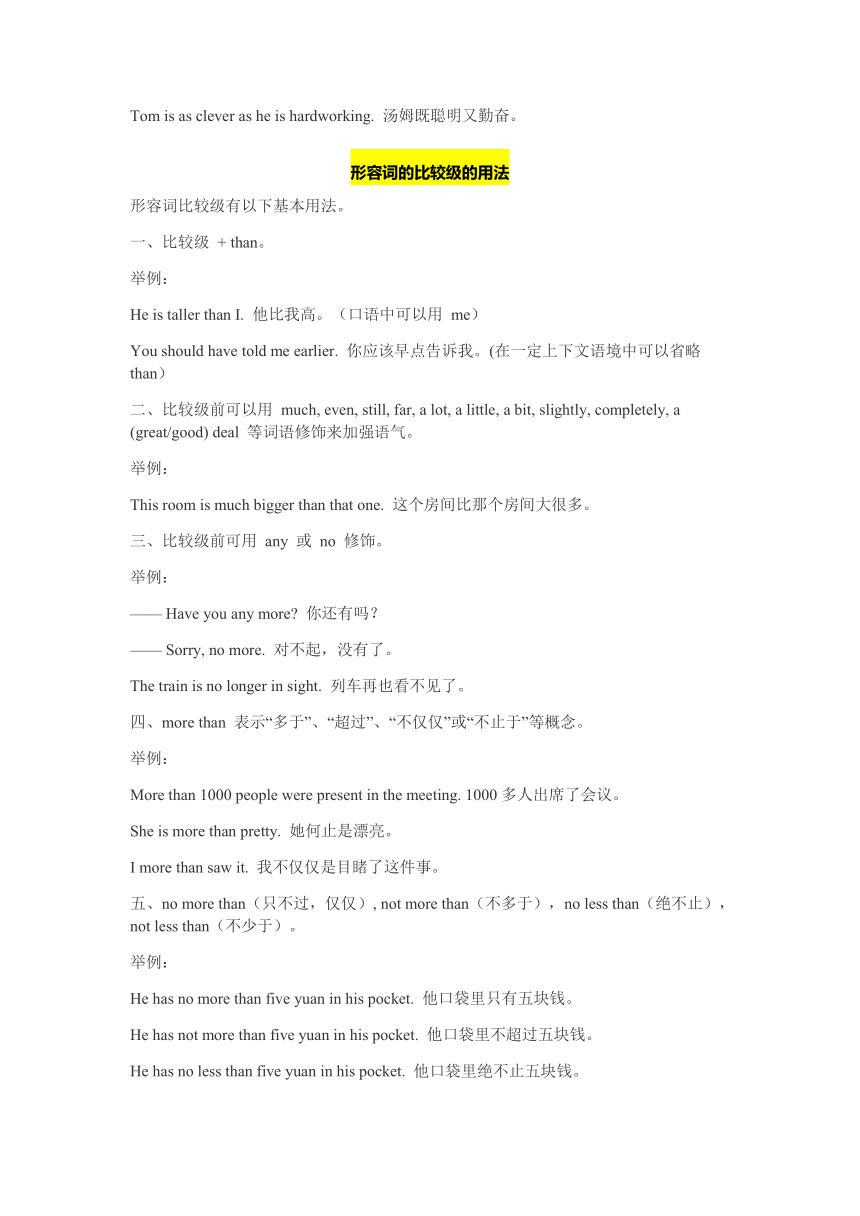2022年中考英语语法总复习形容词原级 比较级 最高级的规则和用法(word版)
文档属性
| 名称 | 2022年中考英语语法总复习形容词原级 比较级 最高级的规则和用法(word版) |

|
|
| 格式 | doc | ||
| 文件大小 | 31.5KB | ||
| 资源类型 | 教案 | ||
| 版本资源 | 通用版 | ||
| 科目 | 英语 | ||
| 更新时间 | 2022-01-19 00:00:00 | ||
图片预览



文档简介
形容词原级/比较级/最高级的规则和用法 2022年中考英语语法总复习
形容词的比较级和最高级的变化规则
形容词是表示事物性质的,用来描写或修饰名词(代词)。大多形容词可以进行梯度划分,分为原级(形容词本身),比较级(更……)和最高级(最……)。其中,比较级和最高级是通过词尾变化来表示的。
!!!形容词比较级和最高级的规则变化:
一、单音节词词尾比较级加 -er,最高级加 -est。举例:
smart - smarter - smartest
二、以 -e 结尾的单音节形容词比较级加 -r,最高级加 -st。举例:
fine - finer -finest
三、以重读闭音节结尾的形容词,双写最后一个字母,然后比较级加 -er,最高级加 -est。举例:
big - bigger - biggest
四、少数以 -y,-er,-ow,-ble 结尾的双音节形容词,比较级加 -er,最高级加 -est;若 -y 字母前是辅音字母,则将 -y 变为 -i,再加 -er 或 -est;若以 -e 结尾,只加 -r 或 -st。举例:
lucky - luckier - luckiest
clever - cleverer - cleverest
narrow - narrower - narrowest
able - abler - ablest
!!!形容词比较级和最高级变化有一些特别值得关注的地方。
一、形容词的比较级和最高级不规则变化:
good - better - best
well - better - best
bad - worse - worst
ill - worse - worst
many - more - most
much - more - most
little - less - least
few - fewer / less - fewest / least
far - farther / further - farthest / furthest
old - older / elder - oldest / eldest
二、less 可以表示“较不……”,least 可以表示“最不……”。
举例:
This book is the least difficult one among all these books. 这本书是这些书中最容易读的。
三、有些形容词没有比较级和最高级,如:right(正确的),wrong(错误的),dead(死的),perfect(最好的),fatal(致命的),final(最后的),entire(整体的,全部的),whole(整体的,全部的),universal(普遍的),sufficient(充分的),vital(最重要的),chief(主要的),main(主要的)等。
形容词原级的用法
同级也叫原级,即形容词本身,用于比较相像的两个事物。
一、用于“as + 原级 + as”结构,意为“……和……一样”。
举例:
He is as tall as I. 他和我一样高。(口语中用 me)
二、同级比较否定式用“not as...as”或“not so...as”结构,意为“……不如……”或者“与其说……还不如说……”。
举例:
He is not so tall as I. 他不如我高。
三、同级比较前可用 just, almost, nearly, half 等词修饰,表示程度,加强语气。
举例:
He is not half as clever as Tom. 他的聪明程度远不及汤姆。
四、形容词同级比较的原级可以采用“形容词+名词”形式。
举例:
I have as many books as Tom. 我的书和汤姆的一样多。
This is as difficult a task as the last one. 这个任务和上一个一样难以完成。
五、用于比较两种不同的性质(两个不同的形容词)。
举例:
Tom is as clever as he is hardworking. 汤姆既聪明又勤奋。
形容词的比较级的用法
形容词比较级有以下基本用法。
一、比较级 + than。
举例:
He is taller than I. 他比我高。(口语中可以用 me)
You should have told me earlier. 你应该早点告诉我。(在一定上下文语境中可以省略 than)
二、比较级前可以用 much, even, still, far, a lot, a little, a bit, slightly, completely, a (great/good) deal 等词语修饰来加强语气。
举例:
This room is much bigger than that one. 这个房间比那个房间大很多。
三、比较级前可用 any 或 no 修饰。
举例:
—— Have you any more 你还有吗?
—— Sorry, no more. 对不起,没有了。
The train is no longer in sight. 列车再也看不见了。
四、more than 表示“多于”、“超过”、“不仅仅”或“不止于”等概念。
举例:
More than 1000 people were present in the meeting. 1000多人出席了会议。
She is more than pretty. 她何止是漂亮。
I more than saw it. 我不仅仅是目睹了这件事。
五、no more than(只不过,仅仅), not more than(不多于),no less than(绝不止),not less than(不少于)。
举例:
He has no more than five yuan in his pocket. 他口袋里只有五块钱。
He has not more than five yuan in his pocket. 他口袋里不超过五块钱。
He has no less than five yuan in his pocket. 他口袋里绝不止五块钱。
He has not less than five yuan in his pocket. 他口袋里的钱不少于五块。
形容词比较级还涉及三大基本句型。
一、more and more 句型,表示“越来越……”的意思。
举例:
The bubble is becoming bigger and bigger. 泡泡越来越大了。
He is becoming more and more active in his class. 他在班上越来越活跃了。
二、the more, the more 句型,表示“越……,就越……”的意思。
举例:
The more haste, the less speed. 欲速则不达。
The taller he grows, the more handsome he becomes. 他越长高就越帅。
三、比较级用于否定结构表示“再……不过”的意思。
举例:
I can't agree with you more. 我非常赞成你的想法。
形容词最高级的用法
形容词最高级有如下用法。
一、用于“the + 最高级 + 比较范围”结构。
举例:
He is the tallest in his class. 他是班级里个子最高的。
二、形容词最高级可用序数词及 much, by far, nearly, almost, by no means 等词修饰。
举例:
Of the three boys he is the second tallest. 三个男孩中,他个头排第二。
Of the three boys he is much the tallest. 三个男孩中,他绝对算最高的。
Of the three boys he is almost the cleverest. 三个男孩中,他差不多算最聪明的。
Of the three boys he is by no means the cleverest. 三个男孩中,他绝对不算最聪明的。
三、most 若前面不加定冠词,可以相当于 very 的用法。
举例:
These are most useful books. 这些是非常有用的书。
四、most 修饰名词,意为“大多数”,前面不加定冠词。
举例:
Most people like travelling. 大多数人喜欢旅游。
形容词的比较级和最高级的变化规则
形容词是表示事物性质的,用来描写或修饰名词(代词)。大多形容词可以进行梯度划分,分为原级(形容词本身),比较级(更……)和最高级(最……)。其中,比较级和最高级是通过词尾变化来表示的。
!!!形容词比较级和最高级的规则变化:
一、单音节词词尾比较级加 -er,最高级加 -est。举例:
smart - smarter - smartest
二、以 -e 结尾的单音节形容词比较级加 -r,最高级加 -st。举例:
fine - finer -finest
三、以重读闭音节结尾的形容词,双写最后一个字母,然后比较级加 -er,最高级加 -est。举例:
big - bigger - biggest
四、少数以 -y,-er,-ow,-ble 结尾的双音节形容词,比较级加 -er,最高级加 -est;若 -y 字母前是辅音字母,则将 -y 变为 -i,再加 -er 或 -est;若以 -e 结尾,只加 -r 或 -st。举例:
lucky - luckier - luckiest
clever - cleverer - cleverest
narrow - narrower - narrowest
able - abler - ablest
!!!形容词比较级和最高级变化有一些特别值得关注的地方。
一、形容词的比较级和最高级不规则变化:
good - better - best
well - better - best
bad - worse - worst
ill - worse - worst
many - more - most
much - more - most
little - less - least
few - fewer / less - fewest / least
far - farther / further - farthest / furthest
old - older / elder - oldest / eldest
二、less 可以表示“较不……”,least 可以表示“最不……”。
举例:
This book is the least difficult one among all these books. 这本书是这些书中最容易读的。
三、有些形容词没有比较级和最高级,如:right(正确的),wrong(错误的),dead(死的),perfect(最好的),fatal(致命的),final(最后的),entire(整体的,全部的),whole(整体的,全部的),universal(普遍的),sufficient(充分的),vital(最重要的),chief(主要的),main(主要的)等。
形容词原级的用法
同级也叫原级,即形容词本身,用于比较相像的两个事物。
一、用于“as + 原级 + as”结构,意为“……和……一样”。
举例:
He is as tall as I. 他和我一样高。(口语中用 me)
二、同级比较否定式用“not as...as”或“not so...as”结构,意为“……不如……”或者“与其说……还不如说……”。
举例:
He is not so tall as I. 他不如我高。
三、同级比较前可用 just, almost, nearly, half 等词修饰,表示程度,加强语气。
举例:
He is not half as clever as Tom. 他的聪明程度远不及汤姆。
四、形容词同级比较的原级可以采用“形容词+名词”形式。
举例:
I have as many books as Tom. 我的书和汤姆的一样多。
This is as difficult a task as the last one. 这个任务和上一个一样难以完成。
五、用于比较两种不同的性质(两个不同的形容词)。
举例:
Tom is as clever as he is hardworking. 汤姆既聪明又勤奋。
形容词的比较级的用法
形容词比较级有以下基本用法。
一、比较级 + than。
举例:
He is taller than I. 他比我高。(口语中可以用 me)
You should have told me earlier. 你应该早点告诉我。(在一定上下文语境中可以省略 than)
二、比较级前可以用 much, even, still, far, a lot, a little, a bit, slightly, completely, a (great/good) deal 等词语修饰来加强语气。
举例:
This room is much bigger than that one. 这个房间比那个房间大很多。
三、比较级前可用 any 或 no 修饰。
举例:
—— Have you any more 你还有吗?
—— Sorry, no more. 对不起,没有了。
The train is no longer in sight. 列车再也看不见了。
四、more than 表示“多于”、“超过”、“不仅仅”或“不止于”等概念。
举例:
More than 1000 people were present in the meeting. 1000多人出席了会议。
She is more than pretty. 她何止是漂亮。
I more than saw it. 我不仅仅是目睹了这件事。
五、no more than(只不过,仅仅), not more than(不多于),no less than(绝不止),not less than(不少于)。
举例:
He has no more than five yuan in his pocket. 他口袋里只有五块钱。
He has not more than five yuan in his pocket. 他口袋里不超过五块钱。
He has no less than five yuan in his pocket. 他口袋里绝不止五块钱。
He has not less than five yuan in his pocket. 他口袋里的钱不少于五块。
形容词比较级还涉及三大基本句型。
一、more and more 句型,表示“越来越……”的意思。
举例:
The bubble is becoming bigger and bigger. 泡泡越来越大了。
He is becoming more and more active in his class. 他在班上越来越活跃了。
二、the more, the more 句型,表示“越……,就越……”的意思。
举例:
The more haste, the less speed. 欲速则不达。
The taller he grows, the more handsome he becomes. 他越长高就越帅。
三、比较级用于否定结构表示“再……不过”的意思。
举例:
I can't agree with you more. 我非常赞成你的想法。
形容词最高级的用法
形容词最高级有如下用法。
一、用于“the + 最高级 + 比较范围”结构。
举例:
He is the tallest in his class. 他是班级里个子最高的。
二、形容词最高级可用序数词及 much, by far, nearly, almost, by no means 等词修饰。
举例:
Of the three boys he is the second tallest. 三个男孩中,他个头排第二。
Of the three boys he is much the tallest. 三个男孩中,他绝对算最高的。
Of the three boys he is almost the cleverest. 三个男孩中,他差不多算最聪明的。
Of the three boys he is by no means the cleverest. 三个男孩中,他绝对不算最聪明的。
三、most 若前面不加定冠词,可以相当于 very 的用法。
举例:
These are most useful books. 这些是非常有用的书。
四、most 修饰名词,意为“大多数”,前面不加定冠词。
举例:
Most people like travelling. 大多数人喜欢旅游。
同课章节目录
- 词法
- 名词
- 动词和动词短语
- 动词语态
- 动词时态
- 助动词和情态动词
- 非谓语动词
- 冠词
- 代词
- 数词和量词
- 形容词副词及其比较等级
- 介词和介词短语
- 连词和感叹词
- 构词法
- 相似、相近词比较
- 句法
- 陈述句
- 一般疑问句和否定疑问句
- 特殊疑问句及选择疑问句
- 反意疑问句
- 存在句(There be句型)
- 宾语从句
- 定语从句
- 状语从句
- 主谓一致问题
- 简单句
- 并列句
- 复合句
- 主谓一致
- 主、表语从句
- 名词性从句
- 直接引语和间接引语
- 虚拟语气
- 感叹句
- 强调句
- 倒装句
- 祈使句
- 句子的成分
- 句子的分类
- 题型专区
- 单项选择部分
- 易错题
- 完形填空
- 阅读理解
- 词汇练习
- 听说训练
- 句型转换
- 补全对话
- 短文改错
- 翻译
- 书面表达
- 任务型阅读
- 语法填空
- 其他资料
